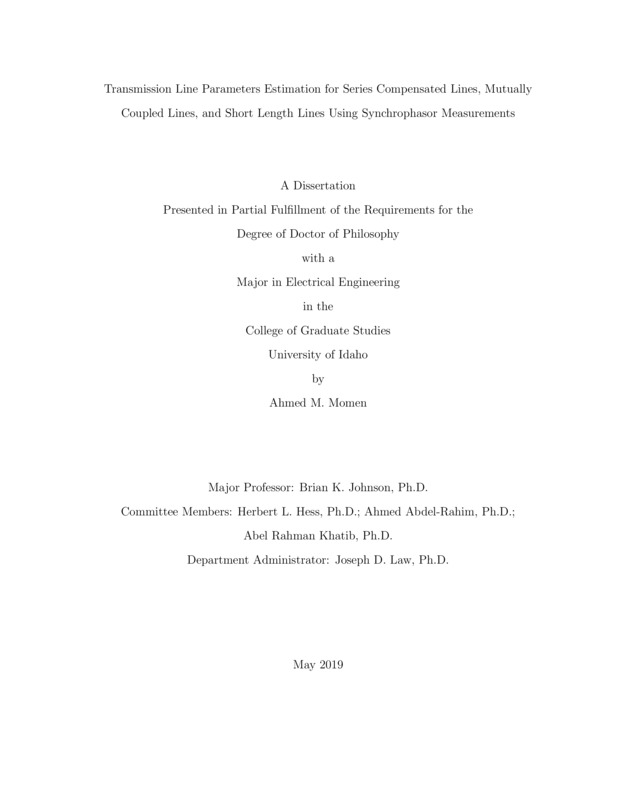Transmission Line Parameters Estimation for Series Compensated Line, Mutually Coupled Line, and Short Line Using Synchrophasor Measurements
Momen, Ahmed Mohammed Saad. (2019-05). Transmission Line Parameters Estimation for Series Compensated Line, Mutually Coupled Line, and Short Line Using Synchrophasor Measurements. Theses and Dissertations Collection, University of Idaho Library Digital Collections. https://www.lib.uidaho.edu/digital/etd/items/momen_idaho_0089e_11541.html
- Title:
- Transmission Line Parameters Estimation for Series Compensated Line, Mutually Coupled Line, and Short Line Using Synchrophasor Measurements
- Author:
- Momen, Ahmed Mohammed Saad
- ORCID:
- 0000-0002-9258-022X
- Date:
- 2019-05
- Keywords:
- Least Trimmed Squares Mutual Coupling Real Time Digital Simulation Series Compensation Short Line Synchrophasor
- Program:
- Electrical and Computer Engineering
- Subject Category:
- Electrical engineering; Engineering
- Abstract:
-
The accuracy of transmission line parameters is crucial for many power system applications such as power flow, relay settings, fault location, and voltage stability. Currently, there are many methods to estimate line parameters for both transposed and untransposed line, but most of them consider only positive sequence parameters and, only a few estimate positive sequence parameters for a series compensated line and partly mutually coupled lines operate at different voltages. Most power system grids in the world used phasor measurement units (PMUs) to at least a limited extent.
Synchrophasor technology is used in this research, which takes the time synchronized measurements of voltages and currents as phasors at both ends of the line. In this research, a new method is developed to estimate line parameters for a series compensated line. The errors in synchrophasor measurements as a result of low-frequency oscillation of the series capacitor in response to a fault, was treated as bad data. The estimation was performed by creating different cases of unbalanced currents in the system and using a Least Trimmed Square (LTS) estimator to detect and reject the bad data. Then, positive, negative, and zero sequence parameters were estimated using the weighted least square method. A comparison between Chi-square which, is a conventional method to detect bad data, and the LTS has also been done.
A new method was developed to estimate the line parameters for mutually coupled lines operated at different voltages. Two separate sets of equations have been built to convert the non-linear equations to linear equations. One set of equations to estimate the shunt capacitance and the second set are for estimating the series and mutual impedance of the targeted line. The method is based on taking one of the lines out of service and creating different states of unbalanced conditions anywhere else in the system. The sensitivity of current transformers introduces a challenge for estimating short parameters. The LTS is used again to detect and reject the sensor error measurements for different inductive reactance to resistance (X/R) ratios.
Initial simulations are performed using ATP to simulate the power system. Next a system of two commercial synchrophasor units, Real Time Digital Simulator (RTDS), a phasor data concentrator (PDC), a GPS satellite-synchronized clock, are used to validate the performance of the new method for series compensated lines. PSCAD/EMTDC simulation is used to validate the developed estimation method for the mutually coupled lines. The ability of the proposed methods to estimate line parameters will be evaluated along with assessing what would be needed to apply them in practice.
- Description:
- doctoral, Ph.D., Electrical and Computer Engineering -- University of Idaho - College of Graduate Studies, 2019-05
- Major Professor:
- Johnson, Brian K
- Committee:
- Hess, Herb; Abdel-Rahim, Ahmed; Khatib, Abdel Rahman
- Defense Date:
- 2019-05
- Identifier:
- Momen_idaho_0089E_11541
- Type:
- Text
- Format Original:
- Format:
- application/pdf
- Rights:
- In Copyright - Educational Use Permitted. For more information, please contact University of Idaho Library Special Collections and Archives Department at libspec@uidaho.edu.
- Standardized Rights:
- http://rightsstatements.org/vocab/InC-EDU/1.0/

